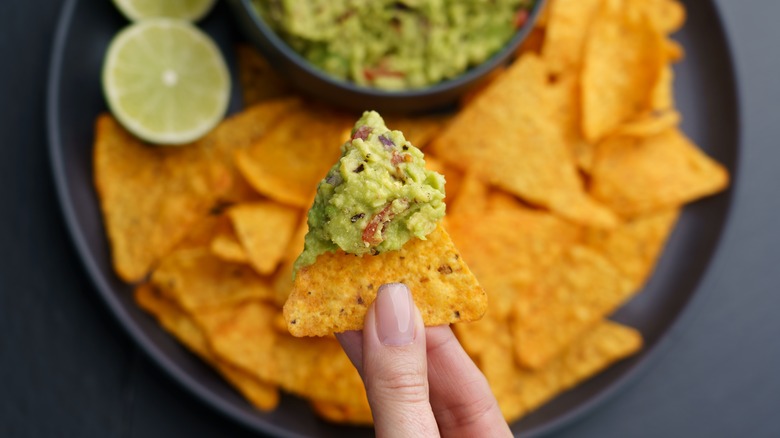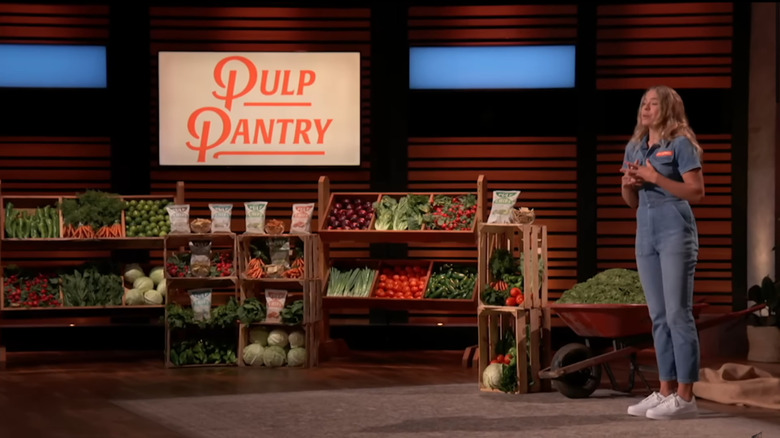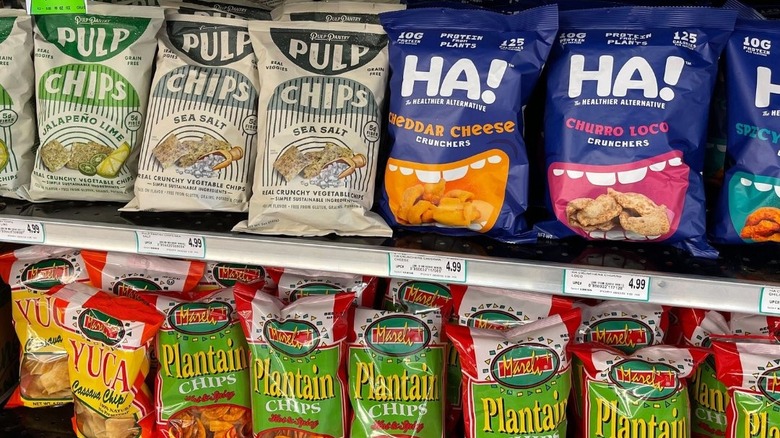Where Is Pulp Pantry From Shark Tank Today?
According to Feeding America, in the U.S., 40% of the food supply goes to waste every year — whether it's forgotten produce tossed out at home, food lost to mass manufacturing plants, or crop competition from farmers. While some individuals are seeking out ways they can help personally help close this gap, from shopping at local grocers to starting a compost bin, some entrepreneurs are taking things into their own hands. Consider Pulp Pantry, a snack company hoping to reduce food waste by converting pulp from juiced vegetables, such as kale and celery, into tortilla chips.
Brainchild of founder Kaitlin Mogentale, Pulp Pantry made its debut on "Shark Tank" in 2022, but Mogentale's passion for sustainability goes all the way back to eighth grade when she watched Davis Guggenheim's documentary "An Inconvenient Truth." The idea for her company came to her years later while in college after she witnessed a friend juicing vegetables — and saw all the pulp that went to waste in the process. After experimenting with vegetable pulp in recipes of her own, Mogentale eventually got a grant from her university to further her mission of finding a use for this otherwise wasted byproduct. Soon, Pulp Pantry was born. Here's how the idea fared in the face of the sharks.
Pulp Pantry takes on the sharks
Making her debut in season 14 of "Shark Tank," Kaitlin Mogentale came to the show seeking 500,000 for 10% of her company. Accompanied by a vibrant display of vegetable pulp and racks of fresh produce — Mogentale gives a visual example of the "thousands of pounds" of veggies that juicing companies would normally throw away. Instead of meeting a landfill, however, the leftover produce is now being converted into Pulp Pantry chips. The vegan, grain-free, gluten-free snack comes in four flavors including sea salt, salt & vinegar, jalapeño lime, and barbecue. Packing in five grams of fiber per bag, as Mogentale puts it, it's your entire day's fiber in a bag of chips.
After tasting a sample of the product, the sharks are impressed with its texture and flavor, and also optimistic about the vegan angle. In turn, Mogentale gets three offers. Kevin O'Leary kicks things off by making an offer of $500,000 for 25% of Pulp Pantry, followed by Lori Greiner who offers $500,000 as a loan for a 10% stake. Mark Cuban then makes an offer of $500,000 for 20% of the company — and seals the deal by bringing up a list of sustainable companies he has already helped get off the ground. Mogentale likes the experience Cuban has under his belt in her part of the industry and talks him down to $500,000 for 17%. Pulp Pantry and Mark Cuban are in business.
The future of this veggie chip brand
Only a few months after its debut on "Shark Tank," and four years after its initial origins, Pulp Pantry is still going strong. The vegetable chips have a list of endorsements from celebrities like Mindy Kaling, and glowing write-ups from big companies like NPR, goop, and Byride. Aside from its online sales, the company is constantly making new appearances on the shelves of supermarkets, including most recently in stores like Whole Foods Market and Sprout's Farmer's Market. Pulp Pantry even has a significant social media presence, with 13,000 Instagram followers.
CEO Kaitlin Mogentale has been given a platform as a sustainability powerhouse and has been able to speak at major events like a recent panel with the Upcycled Foods Association. Pulp Pantry was the recipient of the coveted NEXTY for Best New Salty Snack in 2022 (given in honor of natural products). And with the market for sustainable products expanding every year, we'd bet that Pulp Pantry still has some room left to grow.


